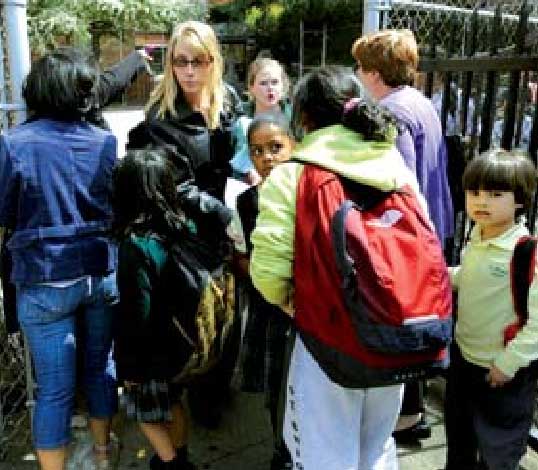
Many think it is inappropriate to teach children about sex, whilst others think it should be a parents' choice to inform their own child, according to a poll by baby product website babychild.org.uk.
The survey, published May 2011, which questioned more than 1,700 parents of children aged five to 11, found that 59 per cent do not agree with the fact that sex education is often taught to children in schools, even from a young age.
Almost half (48 per cent) of those questioned said children should be at least 13 years old before it is appropriate to teach them about sex, the survey found.
Of those that don't agree that sex education should be taught in schools, 41 per cent said it was inappropriate to teach youngsters about the subject, while one in four (28 per cent) said it should be the parents' choice to teach their own child.
A similar proportion (27 per cent) said there was no need for children to know about sex.
Contraception was the most popular topic that parents said should be covered in sex education lessons (chosen by 65 per cent), followed by puberty (49 per cent), homosexuality (48 per cent) and sexually transmitted infections (47 per cent).
Babychild.org.uk co-founder Andy Barr said: 'I am not surprised by the results of the study, with the majority of parents against the idea of sex education in a school environment.
"This is a sensitive subject and parents have their own way to approach it and want to control what their children know, even more so at a young age."
At the moment, both primary and secondary schools have to teach pupils age-appropriate lessons about the biology of sex in science.
Schools must also have a sex education policy, although the subject is not compulsory.
The future of sex education is part of a current review of the entire national curriculum ordered by ministers.
- www.babychild.org.uk polled 1,732 parents in the UK, with children aged between 5 and 11 years old. Respondents were initially asked “Do you agree with the fact that sex education is often taught to children in schools, even from a young age?” to which over half of them, 59%, said ‘no.’
- The respondents who claimed that sex education should not be taught in schools to children were then asked to explain their decision. 41% said that sex education is ‘inappropriate for children,’ whilst just less than a third, 28%, stated that it should be ‘the parent’s choice’ to decide whether or not they wanted to educate their child on the subject.
- A further 22% thought that ‘it might encourage children to ask more about sexuality and sex,’ whilst one in ten, 9%, feared that ‘sex would be trivialized,’ if taught to younger children in schools.
- According to the research, just under half of the total respondents, 48%, also thought that sex education should not be part of the school curriculum until at least the age of 13 and, even then, the majority, 65%, said it should mostly be about contraception. 36% claimed that they thought it should focus more on relationships between men and women.
- Furthermore, when asked ‘Have you already been asked about sex by your children?’ just under two third, 61%, answered ‘yes.’ 47% of these same parents admitted that their child was aged between 4 and 5 when they first asked the question, whilst 36% said they were aged between 6 and 7 when they first asked.
- When asked ‘How did you react when you were asked about sex by your child?’ over a third, 38%, admitted to feeling ‘embarrassed.’ One in three, 32%, ‘didn’t know what to say,’ whilst 13% ‘redirected their children to the 2nd parent’ for them to deal with it and 7% just ‘ignored the question.’